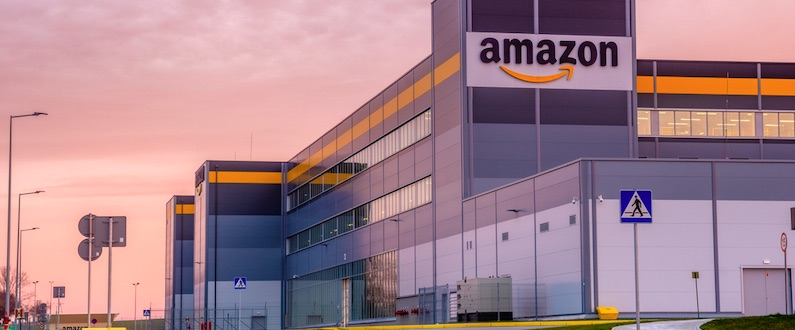
Amazon’s 2016 shipping expense, at $16.2 billion, was 17.7 percent of direct ecommerce revenue. Independent merchants can learn from Amazon by managing carriers and eliminating errors, among other tactics.
If Amazon reduced shipping costs by just 1 percent, it would save $162 million. Amazon spent $16.2 billion on shipping in 2016. We can be certain that it is spending millions to improve and optimize its shipping processes. Ecommerce merchants can take advantage of Amazon’s efforts to increase profits.
Amazon’s 2016 shipping expense was 17.7 percent of direct ecommerce revenue. That’s $8.85 for every $50 order, which is achievable by most merchants.
In this post, I’ll describe three strategies to fulfill like Amazon, even if you have a fraction of its scale and infrastructure.
Manage Carriers
Manage carrier contracts by the numbers. Negotiate better rates using data and analytics.
Analyze accessorial charges. These are extra fees assessed on top of the base rate. Compare every accessorial line item, by carrier, as a percentage of total shipping costs.
- Errors, such as address correction, return charge, and incorrect weight.
- Extra services, such as residential or rural delivery, remote area delivery, and Saturday delivery.
- Surcharges, including fuel charges, hazardous materials and international dangerous goods, and holiday season surcharges. (See the full list for UPS.)
Analyze standard shipping fees for each cost driver.
- Distance, weight, volume.
- Size to weight ratio — e.g., dimensional weight surcharges for light (but big) items.
- Service level — e.g., next day air versus 5-day ground.
Negotiate like a pro.
- Focus on the accessorial fees that have hit you the hardest.
- Negotiate shipping fees with each carrier to match the lowest priced carrier for each category.
- Negotiate insurance fees with each carrier as well as with pure-play insurers.
Enforce each carrier’s service level agreement and negotiated prices.
- Validate that carrier bills are indeed reflecting your negotiated prices.
- File timely reimbursement claims for SLA violations — within 15 days, typically.
Automate intelligent carrier and service selection. In my experience, companies can save up to 25 percent on shipping costs from this strategy alone. No single carrier offers the best rates for every situation. The carrier that charges the least for an in-zone ground shipment may not be the one that charges the least for a 2-pound next day air delivery.
Create decision rules for choosing carriers and service types based on factors such as dimensional weight and delivery zone. Rather than attempting to cover every possibility, start by implementing the rules for 80 percent of your orders. Make sure to meet the minimum volume that you promised a carrier to secure your discounts and negotiated rates.
Implement these intelligent rules across all fulfillment centers and drop-ship vendors and then automate the selection process for your entire order management and warehouse management systems. Here are two examples.
- Geography-based rules. Shipper A charges the least for shipments from New York to Arizona while Shipper B charges the least for same-zone shipments.
- Weight-based rules. Shipper C charges the least for next-day air packages under two pounds.
Manage Yourself
Like Amazon, audit and analyze your own operations routinely to deliver orders faster and cheaper. This may seem obvious, but many mid-market retailers lack the technology and infrastructure. Your ecommerce systems should facilitate automated rules, in addition to answering the following questions:
- Which products are generating the highest discrepancies between the shipping fee invoiced to the customer versus what’s charged by the carrier?
- What is the best carrier for each product, order size, and geography?
- Which shipments resulted in missed carrier SLAs or actionable exceptions?
Eliminate costly errors. Accessorial charges are typically the result of errors. According to Refund Logistics, 31 percent of carriers’ invoices include these extra fees, on average. Common errors and resulting fees include:
- Incorrect address, resulting in address correction and return fees.
- Incorrect dimensions and weight, resulting in DIM charges, which can be eliminated by ensuring product catalog data is accurate.
Intelligent order routing. Route orders to the fulfillment center(s) closest to the customer.
- Ship faster and reduce shipping costs up to 25 percent.
- Pick the least expensive shipping type that gets the package to its destination within the promised delivery date commitment.
Go omnichannel. If you’re an ecommerce merchant with physical stores, leverage those stores as fulfillment centers.
- Ship from store. Shipping from stores can reduce shipping costs and speed up delivery. For example, Best Buy reduced average shipping time by two days with its ship from store program. Revenue may increase, too, with this strategy. American Apparel reported a 30 percent increase in sales from using stores as backup fulfillment centers.
- Buy online, pick up in-store. Offer pickup in-store as a delivery option for online customers. It eliminates shipping fees and increases customer satisfaction. Plus, customers spend an additional 20 percent, on average, when picking up their items.
More Choices, Urgency
Offer more choices. Increase conversions by giving customers delivery options that provide greater certainty of delivery times. For example, Amazon offers these shipping choices:
- “Tuesday, Sept. 12: $5.99 One-Day Shipping.”
- “Wednesday, Sept. 13: Free Two-Day Shipping.”
- “Friday, Sept. 15: Free No-Rush Shipping + Get $5 Reward for Prime Pantry.”
Create urgency to increase conversions. On your product details, shopping cart, and checkout screens, show how much time is remaining to complete the order and still receive guaranteed delivery by the desired date.